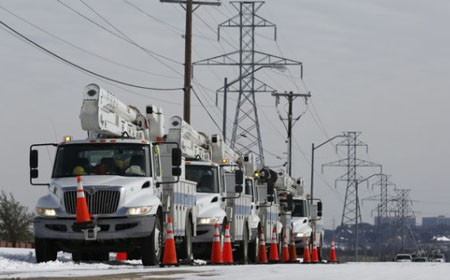by WorldTribune Staff, February 17, 2021
Millions of Texans remained without power amid sub-freezing temperatures on Wednesday. The state scrambled to open “warming centers” as controlled outages were implemented to protect the grid from crashing from a record surge in demand as temperatures plunged to near zero in some areas.
The state’s grid operator, the Electric Reliability Council of Texas (ERCOT), said the grid is down about 14,000 megawatts from what it needs, with 2.7 million households still without power as of Wednesday morning.

The utility said the problems included “frozen wind turbines and limited gas supplies.”
Angry residents were asking how this could happen in oil-rich Texas, which boasts of its energy independence.
“We are very angry. I was checking on my neighbor, she’s angry, too,” Amber Nichols, whose north Austin home has had no power since early Monday, told The Associated Press in a report published on Wednesday. “We’re all angry because there is no reason to leave entire neighborhoods freezing to death.”
“This is a complete bungle,” Nichols said.
Gov. Greg Abbott deployed the National Guard on Monday to conduct welfare checks and bring endangered residents to the 135 “warming centers” set up by state and local governments.
“Due to the severe weather and freezing temperatures across our state, many power companies have been unable to generate power, whether it’s from coal, natural gas, or wind power,” Abbott said Monday. “ERCOT and the PUC are working non-stop to restore power supply.”
Hours after issuing those assurances, the number of power outages in Texas only rose, at one point exceeding 4 million customers.
“This is unacceptable,” Abbott said.
The state’s increased reliance on wind energy has come under scrutiny during the freeze. About 23 percent of the Texas grid is powered by wind, outstripping coal last year as the second-largest generator of electricity after the retirement of several coal-fired plants, and trailing only natural gas.
ERCOT said it could not offer a firm timetable for when power might be fully restored.
Ed Hirs, an energy fellow at the University of Houston, said the problem was a lack of weatherized power plants and a statewide energy market that doesn’t incentivize companies to generate electricity when demand is low. In Texas, demand peaks in August, at the height of the state’s sweltering summers.
Hirs rejected that the storm went beyond what ERCOT could have anticipated: “That’s nonsense. It’s not acceptable. Every eight to 10 years we have really bad winters. This is not a surprise.”
The Dallas News noted that “a big winter storm in 2011 also knocked power generators offline and prompted rolling blackouts in the state. Lawmakers conducted hearings and demanded changes to prevent similar problems.”
Glenn Hegar, a Republican state senator at the time, authored a bill — which became law — that requires the state to track and report how well prepared the state’s electric grid is for extreme weather.
“When I passed this legislation, it was intended to identify the mistakes made in 2011 and ensure that our power grid, including our generation capacity, was prepared for winter weather emergencies,” Hegar, who is now state comptroller, said in a written statement. “While the issues that are plaguing our electric grid system in this disastrous winter storm are complex, I am extremely frustrated that 10 years later our electric grid remains so ill-equipped for these weather events.”
Hegar said the first priority is restoring power to all Texans. After that, he said, “we must address why, after 10 years have passed, are we in a worse position today than in 2011. Why are certain areas going without power for two days or longer, while other areas have successfully navigated through rolling blackouts, or never experience power outages at all? The most pressing question is what can Texas do in the 21st century to ensure that our grid doesn’t experience these issues again?”
Texas House Speaker Dade Phelan on Tuesday called for a joint legislative hearing into the statewide blackouts.
Phelan asked the House State Affairs and House Energy committees to hold a joint hearing on Feb. 25 “for the express purpose of helping Texans understand what went wrong and how we can prevent these conditions from happening again.”
“We must cut through the finger-pointing and hear directly from stakeholders about the factors that contributed to generation staying down at a time when families needed it most, what our state can do to correct these issues, and what steps regulators and grid operators are taking to safeguard our electric grid,” Phelan said.
Intelligence Brief __________ Replace The Media
